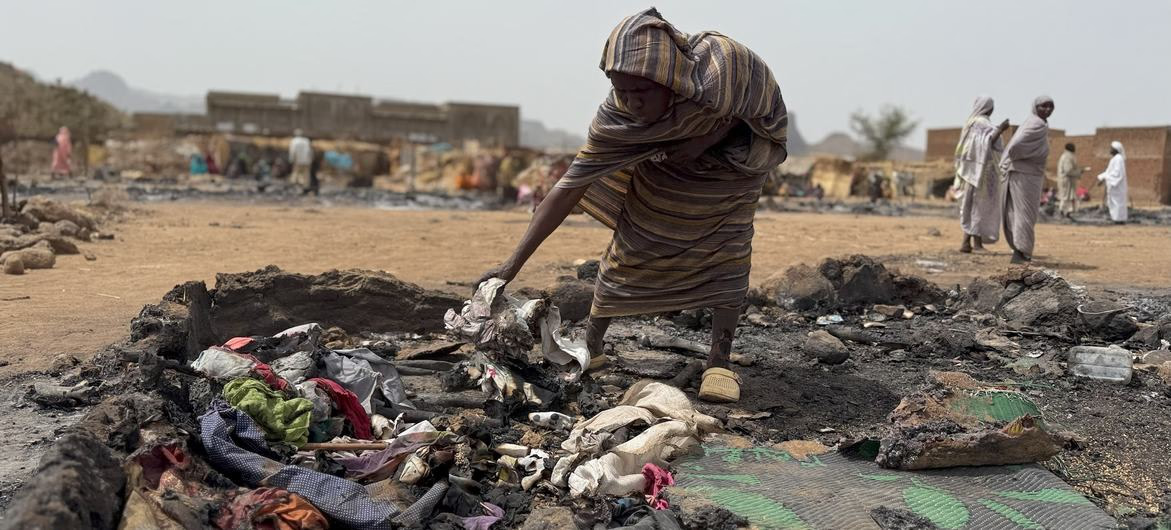
UN alarmed as Sudan's El-Fasher faces escalating violence and humanitarian crisis
The UN Secretary-General has called for an immediate ceasefire amid a "rapidly deteriorating situation" in El-Fasher, Sudan, following a deadly drone attack on a mosque.
22 sept 2025 - 13:22 • 5 min read
The United Nations Secretary-General has voiced "grave" alarm over the "rapidly deteriorating situation" in El-Fasher, the capital of Sudan's North Darfur region, following a deadly drone attack on a mosque that killed more than 70 worshippers. The attack, which occurred during dawn prayers on Friday, has intensified concerns about the escalating violence in the country, now in its third year of brutal civil war.
Antonio Guterres urged an immediate ceasefire and called on the warring parties to return to the negotiating table to find a sustainable solution. He stressed the need for dialogue and the establishment of humanitarian corridors.
El-Fasher remains the last significant stronghold for the government-backed Sudanese Armed Forces (SAF) and its allies in Darfur. The paramilitary Rapid Support Forces (RSF) have been besieging the city for over a year and have recently intensified their offensive to capture it. Humanitarian organizations have warned of a growing hunger crisis as hundreds of thousands of people remain trapped in the city without access to food, medicine, or other essential supplies.
Worsening Humanitarian Catastrophe
The UN has described the humanitarian situation in Sudan as the world's worst, with millions displaced and thousands killed. The conflict, which began in 2023 between the SAF and the RSF, has devastated the nation. Reports from those who have fled El-Fasher indicate that they have been attacked by the RSF while attempting to reach nearby refugee camps. UNICEF estimated in late August that approximately 600,000 people had been displaced from El-Fasher alone.
Military sources reported that the RSF continued to fly drones over El-Fasher and shell the city on Saturday, describing the attacks as among the most intense the city has witnessed. The army blamed the RSF for the drone attack on Al-Safiya Mosque, calling it a "horrific crime." Al Jazeera reported that Friday was one of the "bloodiest days in the city since the RSF started its siege in May last year." Civilian facilities, including hospitals, schools, and displacement centers, have been hit by repeated strikes.
Sudan's prime minister, Kamil Idris, announced that he would raise the situation in El-Fasher at the upcoming 80th session of the UN General Assembly in New York. The attack also reportedly damaged a UNICEF-supported water truck.
International Condemnation and Calls for Accountability
Catherine Russell, UNICEF's executive director, demanded the protection of children, while the UN's humanitarian agency OCHA condemned the mosque attack as "unacceptable" and called for adherence to international humanitarian law and the safety of aid workers. The chairperson of the African Union, Mahmoud Ali Youssouf, also condemned the drone strike as a "heinous" act and a flagrant violation of international law.
The escalating violence in El-Fasher comes as the UN released a report detailing a worsening of summary executions, the targeting of civilians, and ethnic violence across Sudan, particularly in the Darfur region. The report noted consistent trends of pervasive sexual violence, indiscriminate attacks, and widespread retaliatory violence against civilians, often based on ethnicity, targeting individuals accused of "collaboration" with opposing parties. The UN reported 3,384 civilian deaths in the first half of 2025, acknowledging that the actual toll is likely higher.
In July, the International Criminal Court (ICC) informed the UN Security Council that it believes war crimes and crimes against humanity are being committed in Darfur, with rape, sexual violence, and abductions becoming common practices. Prosecutors warned that the situation could worsen.
Peace Process Under Scrutiny
Amid the worsening crisis, international efforts to broker peace are facing scrutiny. A new US-led political initiative for Sudan has reportedly received a lukewarm response from Khartoum. Analysts suggest that international actors risk entrenching the rule of military leaders by granting legitimacy to one side in the conflict. The proposed road map for peace, supported by the United States, Egypt, Saudi Arabia, and the United Arab Emirates, is expected to be discussed at the UN General Assembly. However, concerns have been raised about which factions will be included at the negotiating table, potentially solidifying the grip of military leaders who derailed Sudan's democratic transition.
Sudan's transition to democracy was derailed in October 2021 when the Sudanese Armed Forces and the Rapid Support Forces, then allies, overthrew the civilian government. By April 2023, the two factions turned on each other, triggering a devastating civil war. Both sides have been accused of restricting aid flows and creating puppet governments to advance their agendas, rather than representing the Sudanese people. Experts argue that these forces are primarily driven by financial and political interests, not the aspirations of any civilian bloc.
Civil society groups, including the pro-democracy coalition Somoud headed by ousted Prime Minister Abdalla Hamdok, continue to advocate for civilian representation. However, the international community has often defaulted to the "doctrine of effective control," recognizing whoever holds territory and power, a principle that critics argue incentivizes unconstitutional coups and civil wars. To achieve lasting peace, it is argued, international actors must empower Sudan's civilian representatives, who hold the support of the Sudanese people, rather than its warlords.